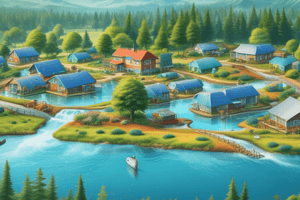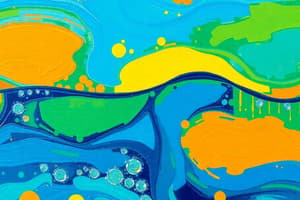Podcast
Questions and Answers
What is the main goal of water conservation?
What is the main goal of water conservation?
- Increasing water wastage
- Ensuring equitable access to water
- Protecting water resources for future generations (correct)
- Maximizing water usage without concern for the future
Which of the following is NOT a key strategy for water conservation?
Which of the following is NOT a key strategy for water conservation?
- Leveraging technology to optimize usage
- Improving water use efficiency
- Educating the public about conservation importance
- Wasting water in homes and businesses (correct)
What does effective water management aim to achieve?
What does effective water management aim to achieve?
- Reducing investment in infrastructure
- Increasing water pollution
- Encouraging inequitable access to water
- Balancing water supply and demand (correct)
According to the World Health Organization, what defines drinking water quality?
According to the World Health Organization, what defines drinking water quality?
What does the water cycle refer to?
What does the water cycle refer to?
What is a crucial step in ensuring high-quality drinking water?
What is a crucial step in ensuring high-quality drinking water?
Which of the following is NOT a common cause of water pollution as mentioned in the text?
Which of the following is NOT a common cause of water pollution as mentioned in the text?
What action can help mitigate water pollution as discussed in the text?
What action can help mitigate water pollution as discussed in the text?
Why is understanding the water cycle crucial according to the text?
Why is understanding the water cycle crucial according to the text?
How can we ensure a sustainable future regarding water conservation?
How can we ensure a sustainable future regarding water conservation?
Flashcards are hidden until you start studying
Study Notes
Water's Vital Chapters: A Comprehensive Guide
Water is the lifeblood of our planet, and it's time to dive into the crucial aspects that keep our world flowing and thriving. In this article, we'll explore the topics of water conservation, water management, drinking water quality, water pollution, and the water cycle.
Water Conservation
Water conservation is the wise use of water resources, reducing waste, and protecting them for future generations. Key strategies include:
- Water use efficiency in homes, businesses, and agriculture
- Leveraging technology to reduce waste and optimize usage
- Educating the public about the importance of conservation
Water Management
Effective water management balances the supply and demand for water, ensuring equitable access and sustainable use of water resources. Good water management includes:
- Improving policy and regulation
- Investing in infrastructure
- Utilizing water markets
- Implementing integrated water resource management
- Maintaining a focus on water-stressed areas
Drinking Water Quality
The World Health Organization (WHO) defines drinking water quality as "water that does not represent any risk to human health when consumed in the prescribed quantities". Ensuring high-quality drinking water involves:
- Monitoring and controlling water sources
- Treating water to remove contaminants and pathogens
- Regulating water distribution systems
- Educating the public about safe water usage
Water Pollution
Water pollution occurs when substances degrade the quality of water, making it harmful to humans, wildlife, and ecosystems. Common causes of water pollution include:
- Industrial waste
- Agricultural runoff
- Sewage
- Oil spills
- Single-use plastics
Water pollution can be mitigated through:
- Improving industrial processes
- Implementing agricultural best practices
- Expanding wastewater treatment capacity
- Reducing plastic pollution
- Implementing green infrastructure
The Water Cycle
The water cycle drives the flow of water throughout our planet, moving water from the atmosphere to the earth's surface, through inland waters, to the land, and back to the atmosphere through evaporation. Understanding the water cycle is crucial to:
- Managing water resources
- Predicting and mitigating natural disasters
- Monitoring climate change
Toward a Sustainable Future
Water is a finite resource that must be managed wisely. By conserving water, improving management practices, ensuring safe drinking water, and reducing pollution, we can preserve water for future generations. As knowledge about water expands, so does our ability to plan for a sustainable future.
Studying That Suits You
Use AI to generate personalized quizzes and flashcards to suit your learning preferences.




